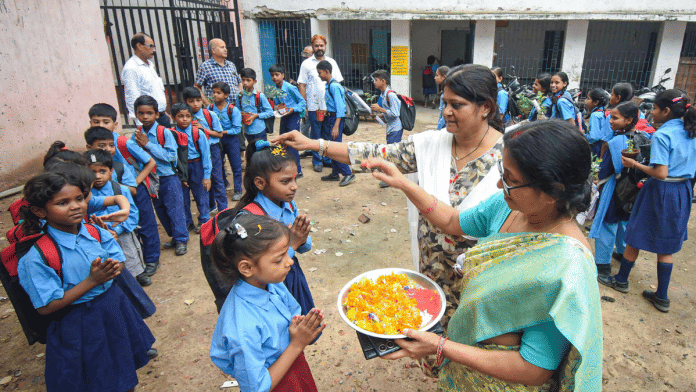New Delhi: A parliamentary panel has said there are about 10 lakh teaching vacancies in the school education system across the country, including in central institutions like Jawahar Navodaya Vidyalayas (JNVs) and Kendriya Vidyalayas (KVs), as well as those run by state governments.
The panel has recommended that vacancies in central government-run schools be filled with permanent appointees by 31 March 2026, and also called for firm action against states that fail to comply with the Centre’s directives on filling these posts.
The Parliamentary Standing Committee on Education, Women, Children, Youth and Sports, chaired by Congress Rajya Sabha MP Digvijay Singh, presented its 368th report titled Review of Functioning of the National Council for Teacher Education (NCTE) and Initiatives Taken to Support Training of Teachers in Light of NEP 2020’s Thrust on Capacity Building of Teachers. The report was tabled in the Lok Sabha 5 August and in the Rajya Sabha 8 August.
According to the report, based on data submitted by the Union Ministry of Education, around 10 lakh teaching posts in the school education system are currently vacant across the country.
The report states that in the academic year 2023–24, there were 63,26,207 sanctioned teaching posts at primary and secondary levels, out of which 9,59,148 remained vacant. In 2024–25, the number of sanctioned posts increased to 69,85,760, but the number of vacancies also rose to 9,82,662
The committee raised serious concerns over the high number of vacancies in JNVs and KVs, calling the situation “alarming”.
“There are overall 30 to 50% vacancies in KVs and NVs also and contractual appointments of teachers are being done in spite of repeated recommendation of the Committee to fill-up the vacancies,” the report stated.
The committee directed the Department of School Education and Literacy to appoint regular/permanent teachers in centrally administered schools no later than 31 March 2026, and to update the committee on the progress.
The committee also urged the Department of School Education and Literacy to take a firm stand on the issue of vacancies in schools funded under the Samagra Shiksha Abhiyan (SSA)—which covers almost all state government-run schools.
“Teachers’ salary component of SSA funds of those states which do not comply with the directions of the Department (of school education) to fill up the vacancies with regular/permanent teachers, should be kept in abeyance till the respective States comply with the directives of the Central Government,” the committee recommended.
‘Stop contractual appointments’
The House panel also recommended the Union Ministry of Education discontinue the practice of contractual appointments in central government schools, stating that it adversely affects the quality of education and undermines the constitutional provisions of reservation for SC, ST, OBC, EWS, and PwD categories.
It further recommended the ministry take up the issue of contractual teacher appointments with state governments as well.
Meanwhile, the committee has recommended against the National Council for Teacher Education’s (NCTE) plan to discontinue the Bachelor of Elementary Education (B.El.Ed) programme—a four-year specialised degree designed to prepare teachers for the elementary level.
“B. El. Ed is a specialized four-year degree with focus on elementary education pedagogy, a crucial developmental stage for children, and its discontinuation based on factors like the number of institutions or structural alignment is a short-sighted approach that risks dismantling a proven program instead of strengthening and expanding it to meet the demand for qualified elementary teachers across the country,” the committee stated.
Earlier this year, the NCTE issued draft regulations proposing the discontinuation of the B.El.Ed programme from the 2026–27 academic session. The four-year course, launched in 1994–95, is intended to prepare teachers for Classes 1 to 8.
Under the new policy direction, institutions currently offering B.El.Ed will need to transition to the Integrated Teacher Education Programme (ITEP), in line with the National Education Policy (NEP) 2020.
(Edited by Ajeet Tiwari)
Also Read: No schools left without teachers, 80% decline in those with only one teacher: Chhattisgarh govt






